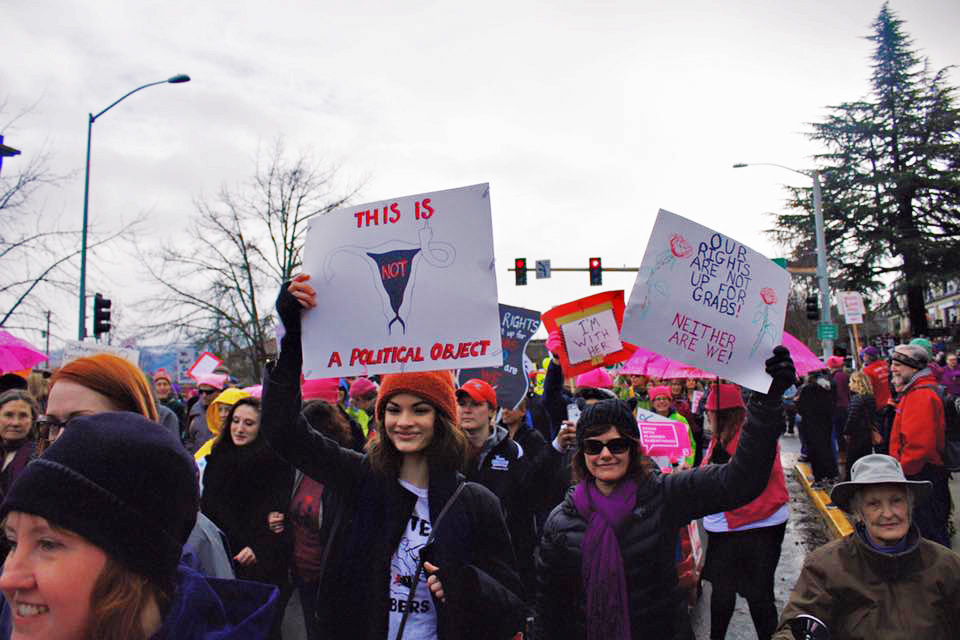
On Saturday Ashland, Ore. became one of 673 different places across the globe that held a Women’s March. This “Sister March” created in solidarity with the Women’s March on Washington had around 15,000 people in attendance according to a statistic posted by FiveThirtyEight. This puts Ashland within the top-thirty of the largest marches in the country.
According to the official Women’s March on Washington website an estimated 4,876,700 people across the world marched peacefully to garner support for reproductive rights, gender equality, affordable health care, action on climate change, and an end to violence against women.

“Even if I don’t feel threatened myself, I need to show up for everyone who does,” said participant Gwen Bogard as she held a sign reading “I am not free while any woman is unfree even while her shackles are very different from my own.”
“I think we can no longer stand for being reticent and complacent humans,” said Clair Harkola a Southern Oregon University student. “We need to protest and have our voices heard.”
This sentiment was echoed throughout all who attended the bright, if drizzly, Saturday morning march equipped with signs and pink hats. Men in attendance carried signs that said “girl power” and were vocalizing their support of the march as well as what it stood for.
“It’s really lovely seeing people stand against what they don’t believe in, and the signs are really powerful,” said Rachel Routh, another participant. Among those signs were ones that read “A Women’s Place is in the Rebellion,” “Black Lives Matter,” “Diversity, Love, and Kindness make America Great.”
“Far more people showed up than we ever imagined, which confirms that there was a need for something like this,” said Sharon Dohrmann, one of the organizers of the Ashland Women’s March.

The day after the election, Dohrmann came together with family friend Samae Chlebowsie after dropping their daughters off at school. “We were really conflicted by the results—in shock,” Chlebowsie described. Both revealed that their original plan was to organize a peaceful vigil on inauguration night to allow people to acknowledge their anxiety “rather than push it away.”
After putting that idea out into the community the mothers received responses from people whose feelings reflected theirs. In these responses, many expressed their inability to go to the march in Washington D.C. and wondered if the women would be willing to head that event rather than a vigil. “The event really bloomed out of our own personal desire to do something tangible to express our concerns and sadness,” said Dohrmann.
While neither woman had ever organized anything of this magnitude before, the two sited their passion and the support of the community as the reason behind their success. The co-creators expressed the need to set good examples for their daughters. “We can’t enjoy the things we love if we sit back and let somebody else take care of the things we believe in,” said Chlebowsie.
The route through the downtown area ended in Lithia park where the marchers were greeted by guest speaker Irene Kai, an artist, publisher, educator, and activist. The RCC instructor’s message: “let us make a promise to ourselves, to our children, and their children, that we will love and protect each other, our family, our community, our city, our state, our country and our mother earth from neglect, abuse, discrimination and tyranny.”
This was the largest single-day protest in United States history. It spanned across states both red and blue, and it illustrated nation’s ability to be unified. In Ashland calls for women’s groups and other places to discuss politics, beliefs, and involvement are continuing in response to this event.



